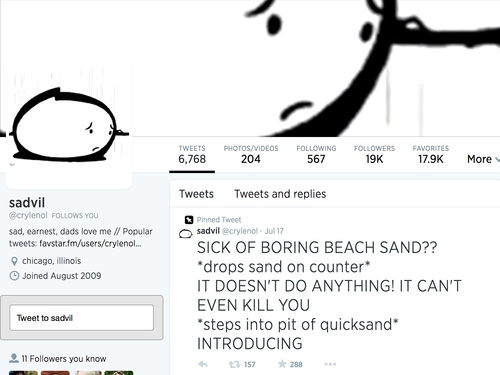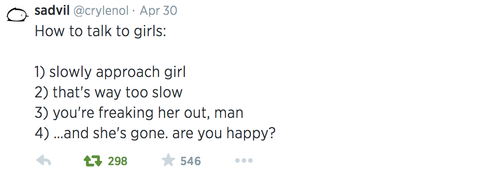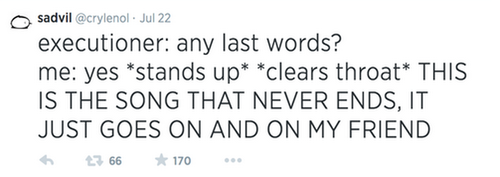
Welcome to Week 8 of What Would Twitter Do? where I interview ten of my favourite people on Twitter about their Twitter philosophies, behaviour, and what they make of the medium in general. This week features the magnificent @crylenol/sadvil, who has among the most funny, entertaining and bizarre feeds I’ve ever read. Nothing personal, nothing political, no links. The tweets are often structured like mini-plays, and there is an undertone of misery to the whole entire thing, which gives the humour some of its meaning and gravity.

Some days, I retweet five of C/S’s tweets in a row, no doubt annoying everyone (and pleasing everyone else). Part of the enjoyment I take in this feed, unlike with the celebrities or friends I follow, comes from knowing absolutely nothing about @crylenol/sadvil—what’s this user’s age? What else does C/S do with his or her life? I chose not to ask questions that would puncture the mystery—and in fact C/S indicated to me that his or her preference (though I’ve always assumed C/S is a he) was for anonymity, too. Here is our conversation, conducted over email.

SHEILA HETI: What made you join Twitter in August 2009?
CRYLENOL/SADVIL: I joined Twitter thanks to peer pressure haha. My close friends had joined. The @crylenol account started under a different, more personal username.
SHEILA HETI: Did you take to it right away, or did it take some time to find your “voice”?
C/S: So I didn’t start making jokes on my Twitter account until January 2013. It was at that point I had come home from college and was diagnosed with depression and anxiety. You’ll notice my avatar is the cartoon blob from the Zoloft commercials—this came before I even though of “sadvil,” “crylenol,” or being funny. I was just sad. I don’t know what’s left of my tweets from before this point. I recall deleting some; others I think have been archived. And while they weren’t depressing in themselves, I figured that Twitter could become a more positive influence in my life, so I began following comedy accounts. My account went public in February of that year, and I think for the first month it was mostly observations about my daily life. After that, I began to follow the “Twitter comedian” accounts, those whose comedy work—though many wouldn’t call it that—consists mainly of tweets, and began to make jokes along formulas. I still joke along with formulas, but I don’t think it was until April that I felt like I could make a tweet that was original enough to stand on its own.
All that being said, I’m happy to not have a “voice” like some people do. Sadvil and @crylenol imply a certain sadness, but I don’t think it necessarily envelops my tweets or predetermines anything I say. It’s managed to be a brand that hasn’t really held me down to any obligations of character.
SH: I find you very formally experimental—there’s a lot of dialogue and conversation in your tweets, almost like little plays. It’s like your feed is a stage for other characters. Do you remember when or how you moved into doing this?
C/S: I’m glad you see that as a style. It’s something I’ve always aimed for but feel like I often miss. There were many influences that led to this, foremost was Family Guy, which, you know, I was in middle school from 2004-2007, so it was the height of comedy. The non-sequitur style formed a lot of what I thought was funny. I noticed a similarity in some early twitter accounts I followed, namely the defunct @broismeeeee; the mostly retired @pajamabenladen (now @pajamaben_); and an account that has since abandoned any remnant of the style, @dildo_hitler (now @fred_delicious).
So I’ve found my favorite tweets, and often the most successful, were those that conjured a scenario that had some substantive joke to them. It’s not easy, and I usually disappoint myself with their structure or wording. Nevertheless, they’re great to read, and anyone trying out the style, even when it’s not funny, often stumbles onto something imaginative and original—so they often have value even in failure. In the simplest form, I’m still astounded by the “*x voice*” format, e.g. *batman voice* this Subway needs a hero. With that, it’s a simple joke I just now put together (Subway/hero + generic “needs a hero”), but the beauty is hearing, in your own head, the voice of Batman!
SH: You said in your DM to me that you don’t think much about Twitter—but your tweets are so varied and inventive. Did you mean that you don’t think much about the medium of Twitter or you don’t think much about your tweets before you send them out?
C/S: I don’t think much about either. As you move up the “weird twitter” or “twitter comedian” ranks, this often is made possible by talking to other people about twitter, engaging in a community that is—often—mostly concerned about twitter itself. I’ve never been a part of that. And friends who know of my account have come up asking me for insights as to why I partake, or what’s the importance, and I’m often without any kind of explanation. Of course, for me, tweeting was initially a distraction from anxiety and depression, so to become preoccupied with it would defeat the purpose.
SH: Do you spend a long time crafting your tweets, or do they sort of just appear to you?
C/S: I wish I spent more time crafting my tweets! A few of my top tweets have typos that I would have noticed if I had just read through them once. But, no, I tweet impulsively. A lot of joker-writers will come up with an idea and save it in their draft folders to work out, and others will save jokes for “peak hours” or to spread out over a period of time. I tend to work quickly and without workshopping—my draft folder is almost always empty. So you’ll see typos, and you’ll see tweets hastily deleted after I’ve hit send an an obvious error.
Still, I’ve spent almost a year and a half as a part of this Twitter joke experiment, so I’ve internalized certain style and presentation aspects that I think will make for more successful tweets.
SH: Do you think of them when you are doing other work, or walking? When do they tend to come?
C/S: I tend to think of my tweets while I’m on twitter. I should admit that rarely do I find my own tweets funny, so I see twitter as a reservoir of “funny topics” to work with. Occasionally, things will come to me as I live my daily live, but I try as much as possible to separate that from twitter. So that, only when I’m on twitter, that’s when I’m thinking about material. The great fear is that I’ll come off as unoriginal, but it seems to work out all right.
SH: Are you surprised that people love your tweets, or is it something you deep down would have expected? Like do you or did you feel, “I’ve got this…” I guess I’m projecting a level of confidence on you because your feed seems very confident and assured.
C/S: I truly believe my tweets are not that funny. Even the individuals I follow, who I find exceptionally funny, often tweet terribly banal jokes. I have over 6,000 tweets now, though, so through all that—let’s say 4,000 of those are jokes—you can get a sense of what people like. But I would say I’m mostly surprised by what I see do well, and what I see other people finding funny. Really I’m trying to make other people laugh. And that’s not altruistic; it’s just that seeing a tweet become successful is much more enjoyable than any humor in the tweet itself, for me.
I think part of the confidence is that I rarely tweet about myself. Some accounts have managed to be quite personal, even behind a shield of cartoon anonymity (I’m thinking of @saddesttiger here). It’s frustrating in that I think it alienates any twitter peers and leaves followers seeing me as a joke machine. There’s nothing worse than, as I have, occasionally tweeting something personal and having a follower, as they have, respond asking where’s the joke. But I’m an introverted person, and that doesn’t change on twitter. It’s not that I’m intentionally unfriendly, it’s that I’m not looking to open up.
SH: Your feed is the funniest one I know. Do you think a lot of the humour on Twitter is lame? Do you roll your eyes a lot?
C/S: Thank you. That’s great to hear. The number of twitter comedians I follow (much of my following number consists of personal friends heldover from my previous incarnation) and my favorites count, it’s comparatively low to my peers. So yes, I do find much of what people tweet to be lame—whether it be personal material or attempts at humor. I didn’t always think that.
SH: What sorts of people do you enjoy following on Twitter?
C/S: Sportswriters have some of the best feeds of any group or profession. I’m still getting into that, though. For comedy, my favorite accounts tend to be nonprofessional comedians with a slant towards creating scenarios, @ceejoyner and @ch000ch are some of the best, but I’d hate to make a list. I also like the oft-subtle, indescribable absurdity of a @seanblazed or @ieatanddrink. For satire, @swarthyvillain and @boringasheck are excellent.
SH: I’m assuming you sometimes see people copying your style. How do you feel when you encounter that?
C/S: I think by the time I became popular enough to have a style worth copying, I stopped paying much attention. I may have been among the first of the cartoon-ed “weird twitter” community to really try to work on scenarios, but I was doing that at the same time as a few others. The institutional memory at Twitter is so scant, it’s just tough to say who’s copying whom. But good for them, as long as they aren’t stealing what’s funny about my tweet (e.g. the format of this tweet—

—which really makes the joke possible). I’ll probably end up following them.
SH: Do you think or hope that Twitter will be around for a long time? If it disappeared, would you feel any relief? How would you feel if it was shut down, and if it was, what do you think you would put your Twitter energy into (I’m assuming you have a lot of energy for Twitter).
C/S: Twitter is a unique and possibly dying place, but I think the quick, personal blog is necessarily going to have some kind of replacement. I expect there would be an exodus of the narcissistic masses to some other place where they can put their feelings on blast. It’s absolutely addictive. I’m hoping that separating personal self from my material would make such a transition easier, though.
SH: Do you ever feel compelled to respond to people who tweet to you? What do you think you responsibility is to your followers?
C/S: I don’t feel compelled. I don’t think most people would at this point in follower counts. If someone asks me to read a tweet, I usually do. If someone gives me a compliment, I’ll favorite that tweet. If someone complains or groans, I tell them they “get what they pay for.” I think that’s the typical route for accounts.
Underlying that statement is that I actually have no idea what my responsibility to my followers is, and usually I don’t consider it. I’m mostly surprised people still follow me. For every good joke, I’ll have 10 mediocre ones, and at least 2 bad ones. They stick around though, which is great. And as my follower count grows, I may subconsciously be trying to avoid tweeting awful jokes.
SH: There seems to be an element of self-loathing in your tweets. Do you feel emotionally gratified by the likes and retweets, or do you mostly not have emotions about that sort of thing?
C/S: In regards to the self-loathing, I fail to see how it necessarily connects. Would it propel me to seek popular approval? I think that might be a factor in all this. I was never considered very funny as a kid, so I indulge in a sort of bitterness about that nowadays. Retweets are just retweets, though. However much I appreciate them, I don’t see them much affecting my sense of self-worth. I mean, I am better now, happier, but I’m not sure that has anything to do with Twitter. If anything, it has to do with my detachment from Twitter. It’s nice to have something on the side that’s frivolous.
SH: If someone wanted you to write for a network sitcom, would you?
C/S: Absolutely. Do you know someone?
Week 1: Kimmy Walters
Week 2: Kate Zambreno
Week 3: Teju Cole
Week 4: Mira Gonzales
Week 5: Tao Lin
Week 6: Christian Lorentzen
Week 7: Patricia Lockwood
Week 9: Various
Week 9 ½: Melville House
Week 9 ¾: Roxane Gay
Week 10: Kenneth Goldsmith




